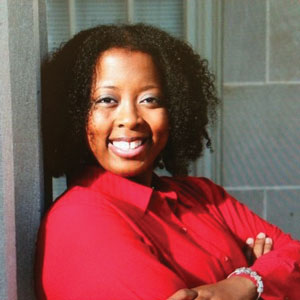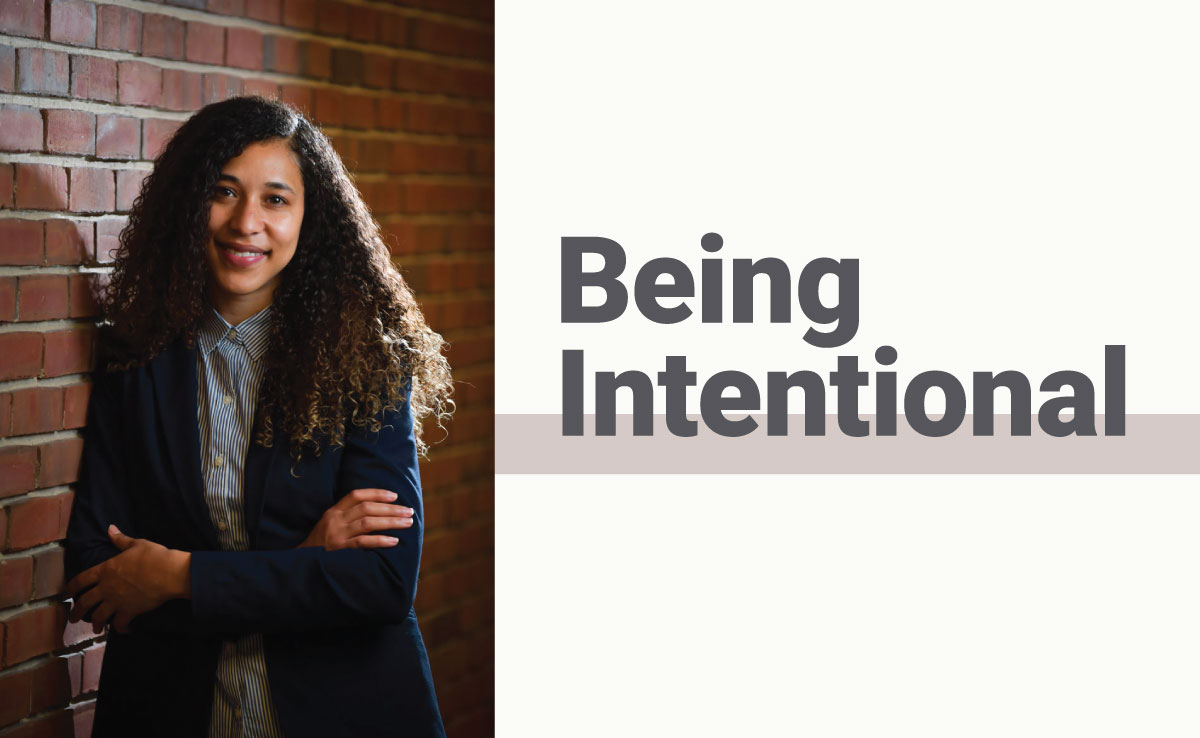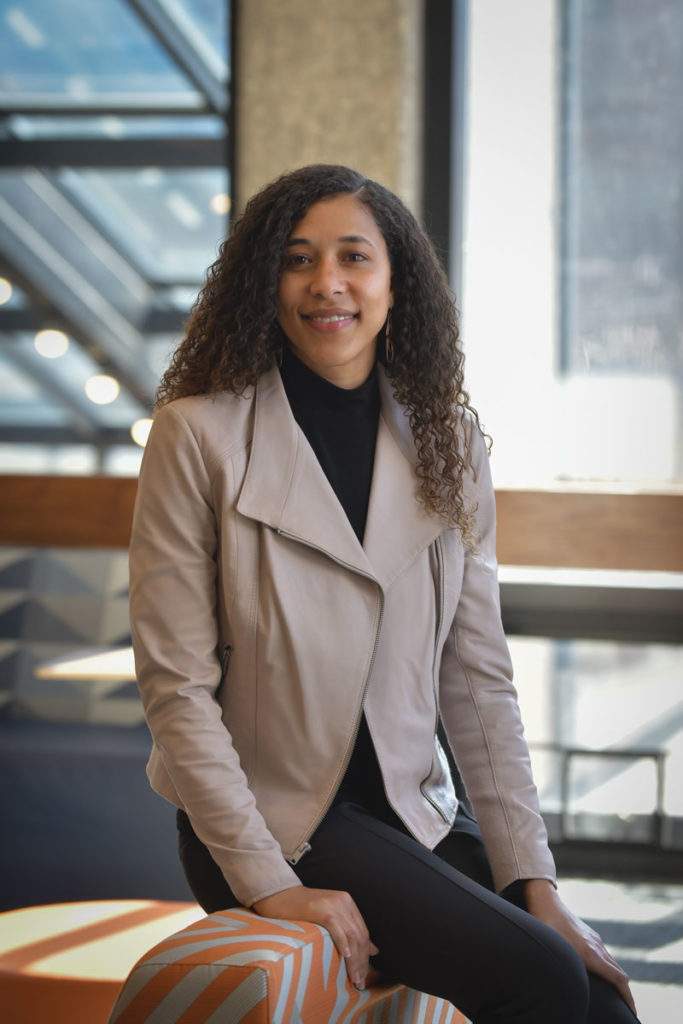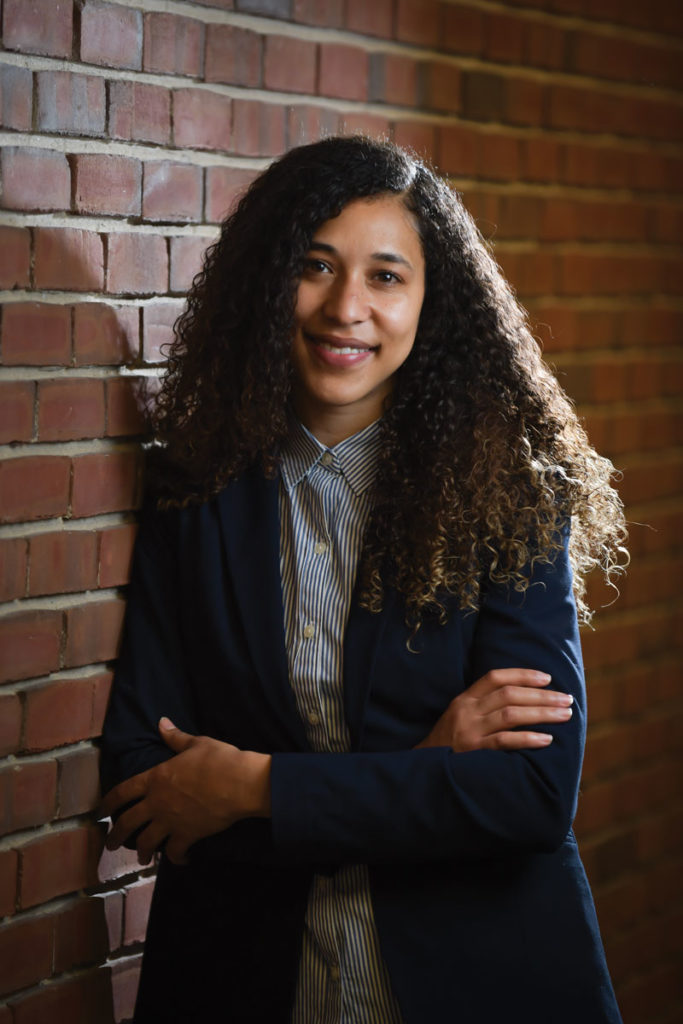Being Intentional
Kamara Sudberry ’15
joined the Hope staff in January in a role that is likewise new for the college itself, as engagement officer for diversity, equity and inclusion with Alumni Engagement.
Counting from when she was a first-semester freshman, the Flint, Michigan, native has been a member of the Hope family for nearly 10 years. As a student, she dual-majored in management and political science, studied abroad through the Vienna Summer School, was a member of the women’s basketball team and served as a resident assistant. Prior to returning to Hope as a member of the staff, she served first with AmeriCorps, working with Goodwill Greater Grand Rapids as an outreach specialist to help those who were unemployed or underemployed, and more recently as a community health and diversity, equity and inclusion specialist at Spectrum Health with an emphasis on improving the social determinants of health of vulnerable communities and enhancing support for employees from all backgrounds.
News from Hope College sat down with her to learn about the work that she’s doing and why.
Q&A
Welcome back to Hope! Will you please tell us about your position at the college?
Thank you — I’m excited to be back! My role is to collaborate with the Center for Diversity and Inclusion and many other campus partners to serve underrepresented alumni and families. I also support new emerging work in that space: specifically, the Alumni of Color Advisory Council, a newly formed group that hopes to build and strengthen relationships with alumni of color, as well as allies. I’m proud to work alongside my Alumni and Family Engagement team, and we are committed to elevating the voices of all Hope College alumni.
“This position is not necessarily new for the DNA of Hope, but it is new, I think, when it comes to taking intentional approaches. I’m sure a lot of the things that I will be doing were ideas that were put forward before. But it is nice to be a part of manifesting and really bringing those ideas to life.”
What should people know about Hope’s addition of an engagement officer for diversity, equity and inclusion?
“Last year brought heightened awareness to what advocates for BIPOC communities, or Black, Indigenous and People of Color, have been saying for years. I’m thankful to see the growing field of diversity, equity and inclusion throughout many different systems and organizations. And I think it’s important to note that Hope College is not the exception.
“There is a lot of good work that needs to be done, and there are so many opportunities and ways that we can make it better for all. I think the larger Hope community should be encouraged to see us creating space at the table and taking intentional steps in the right direction. At this time, my focus is to serve as an active listener, connector and collaborator with the diverse alumni network of Hope College and prioritize diversity, equity and inclusion in everything we do.
“That takes being vulnerable, that takes rethinking processes and co-building solutions to systemic barriers. It’s sometimes uncomfortable and hard, but I often feel that leaning in to that is where healing and reconciliation can take place. And I applaud my alma mater — and now my employer — for realizing that that’s a space that we need to be in.”
You mentioned the Alumni of Color Advisory Council [new in 2020]. Could you please describe it and what it brings to the process?
“The formation of the Alumni of Color Advisory Council is definitely a testament to the organizing and leadership of Vanessa Greene, former director of the Center for Diversity and Inclusion. This group started meeting informally last semester, and has already grown into a powerful resource for the college. The council meets bi-monthly and advises the college on ways to empower and strengthen relationships with students and alumni of color. The board consists entirely of BIPOC alumni volunteers, and is co-chaired by Dr. Tiffany Labon ’05 (pictured upper right) and Courtney E. Brewster ’04 (pictured lower right). We’re fortunate to have their voices at Hope right now, to have people continuing to reach out and give us the good and the bad. We need this form of feedback, it is healthy. I know we as human beings sometimes get defensive when we hear constructive feedback, but it makes us all better.”


What made Hope a place to which you wished to return as a staff member?
“As much as I love the women’s basketball program and Lake Michigan, honestly, it was the people of Hope. I’ve met people who feel like family at Hope — who are part of my family now, my village and my tribe. Coming back to serve them in any sort of capacity is such an honor, because truly, I am being paid to do something I would most likely do for free, especially for the people that I love.
“And then also just the opportunity to meet more people. Higher ed is a unique space to be in because you get fresh new faces every single year and the opportunity not only to make a difference in their lives, but to gain so much from those relationships. And maybe in a selfish way, I just wanted some more of that magic.”
“I think that [Hope’s resiliency through COVID-19] can be translated to diversity, equity and inclusion, especially with the same intent and the same emphasis behind it.”
What are you most looking forward to in the months ahead?
“I think what’s really cool about Hope is that — and probably other higher ed places say it — you really should belong to the Hope College community for the rest of your life. That’s a growing philosophy, I think, under President Scogin, and I’m excited to explore what that looks like for all alumni of Hope. When our alumni don’t feel that sense of belonging, it’s understandable for them to disassociate and to not reach back out, but I really want to change that through my work.
“Hope has proven its resiliency through COVID to be one of the only colleges, that I know of, that has maintained some sense of normalcy. And I think that resiliency can be translated to diversity, equity and inclusion, especially with the same intent and the same emphasis behind it. No one wanted the pandemic, but we want diversity, equity, inclusion. And with that desire, I imagine that really the sky’s the limit.”
Is there anything you’d like to add that the other questions haven’t touched on?
“I know that there’s both curiosity and cautiousness around diversity, equity and inclusion work. I think that’s extremely normal, and I harbor that as well. So any person really coming with that mindset or questions, I welcome them in. I want everyone to know that I can be reached, that I’m here to listen and to be a resource.
“Also, the second thing that I want everyone to know is if there are any alumni out there who are thinking about how Hope can be a help, especially now that COVID-19 has changed the landscape of our world, we would love to engage with them. Maybe someone is considering a job change, or going through a time of transition or thinking about professional development like getting board experience or public speaking experience. We would love to be a support system to them, because no matter what, we see you as a community member of Hope, and you are a part of our family. Know that we have your back if you need us.”



